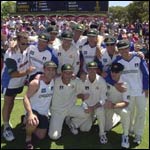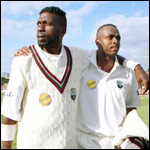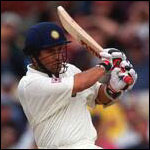The year of the fix!
The year of the fix is how 2000 will be remembered in cricket history. A series of revelations that begun with Hansie Cronje's forced admission that he had taken money from bookmakers and culminated earlier this month with Mohammad Azharuddin's life ban for match-fixing inflicted major damage to the international game's credibility.
As the game struggled to absorb the constant drip of successive revelations Australia confirmed their position of recent years as the world's best team.
 Steve Waugh's side broke the West Indies 16-year-old record of 11 consecutive Test cricket wins with victory by an innings and 27 runs in the second Test over the West Indies at Perth earlier this month.
Steve Waugh's side broke the West Indies 16-year-old record of 11 consecutive Test cricket wins with victory by an innings and 27 runs in the second Test over the West Indies at Perth earlier this month.
Waugh is a shrewd captain as well as arguably the most resilent batsman of his generation while his team's all-round ability in the field has turned the excellent into the routine. However, claims that they were the best Test team ever were hotly disputed, although the way fast bowler Glenn McGrath's 300th Test wicket came as part of a hat-trick spoke volumes about Australia's current dominance.
Meanwhile England under captain Nasser Hussain, with shrewd advice from Zimbabwean coach Duncan Fletcher, started to show they were a team worth beating.
'Pressure' is the most overused word in sport but the turbulent domestic situation back home meant the Zimbabweans really were suffering as they lost 1-0 in England.
Then all-rounder Neil Johnson and batsman Murray Goodwin, two key Zimbabwe players announced their retirement from Test cricket in order to pursue more lucrative domestic careers in South Africa and Australia respectively.
England, however, went on to win their first Test series against the West Indies for 31 years: by the time Australia made it 13 wins in a row at Adelaide, the West Indies had lost 17 of their last 19 overseas Tests.
 In England a series of spectacular batting collapses -- 54 at Lord's, for example meant the West Indies bowlers never had a chance, although Curtly Ambrose and Courtney Walsh kept going magnificently.
In England a series of spectacular batting collapses -- 54 at Lord's, for example meant the West Indies bowlers never had a chance, although Curtly Ambrose and Courtney Walsh kept going magnificently.
At Headingley, England's fourth Test win was completed before the weekend. It was the first time a Test had been won inside two days since Australia beat New Zealand at Wellington in 1945/46.
Ambrose, having reached the landmark of 400 Test wickets earlier in the series, later announced his retirement.
However, Walsh enticed by the prospect of becoming the first to reach 500 wickets, nobly decided to solider on.
Brian Lara seemed to spend more time with psychologists than in the middle but innings such as his 182 in Adelaide proved his talent was intact.
As his captain Jimmy Adams remarked: "It is very hard to get inside the mind of a genius."
 No less remarkable was the continued ascent of Sachin Tendulkar. After an unbeaten double century against Zimbabwe at Nagpur in November, Tendulkar had scored 6,416 runs at an average of 57.28 including 24 centuries.
Unfortunately he was denied the chance to play Tests in Pakistan when the Indian government -- not the cricket board -- called off the tour.
No less remarkable was the continued ascent of Sachin Tendulkar. After an unbeaten double century against Zimbabwe at Nagpur in November, Tendulkar had scored 6,416 runs at an average of 57.28 including 24 centuries.
Unfortunately he was denied the chance to play Tests in Pakistan when the Indian government -- not the cricket board -- called off the tour.
Bangladesh made their Test debut and although defeated by India, Aminul Islam's 145 was the best maiden innings since Australia's Charles Bannerman made 165 not out in the very first Test match, against England in 1877.
Pakistan's year finished on a downbeat with a surprise 1-0 series loss to England. The tourists showed unexpected fortitude against spin and won the final Test to end Pakistan's unbeaten record at Karachi.
That match ended in mild farce when, after slowing the over-rate down, Pakistan captain Moin Khan complained to umpire Steve Bucknor about the fading light.
Bucknor showed admirable firmness suggesting that officials need character more than the depressingly lengthy new set of Laws issued by MCC. The main change, five-run penalties for major misdemeanours, won't even apply to Test matches following a typical ICC fudge.
Sri Lanka's Arjuna Ranatunga announced his retirement admist internal disputes. There may have been better batsmen but the World Cup winning captain was unmatched in his ability to annoy the opposition.
In South Africa, Ali Bacher, the man who kept the game going during the apartheid years and shephered it through its international return stepped down.
The former Test captain did not deserve to have his last year in charge blighted by Cronje. There was better news, when thanks to the development programme he helped start, 21-year-old black paceman Mfuenko Ngam was called up into the Test squad to replace the injured Allan Donald.
India's Lala Amarnath, their first Test centurion, died aged 80 and West Indies left-hander Roy Fredericks (57), whose astonishing 165 against the might of Dennis Lillee and Jeff Thomson at Perth in 1975 was undoubtedly one of the great Test innings, succumbed to cancer.
In December, England's Colin Cowdrey (67), arguably the most graceful batsman of his generation and later a distinguished administrator, as befitted a man born with the initials MCC, died of a heart attack.
He was the first to play 100 Tests -- he marked the occasion with a hundred - and made six tours of Australia, the last aged 42 when summoned as an emergency replacement he faced 'Lillian Thomson' with courage and classical technique.
It was a poignant coincidence that his death was announced on the same day that Azharuddin, the most elegant batsman of his time, was handed a life-ban for match-fixing.
Mail Cricket Editor